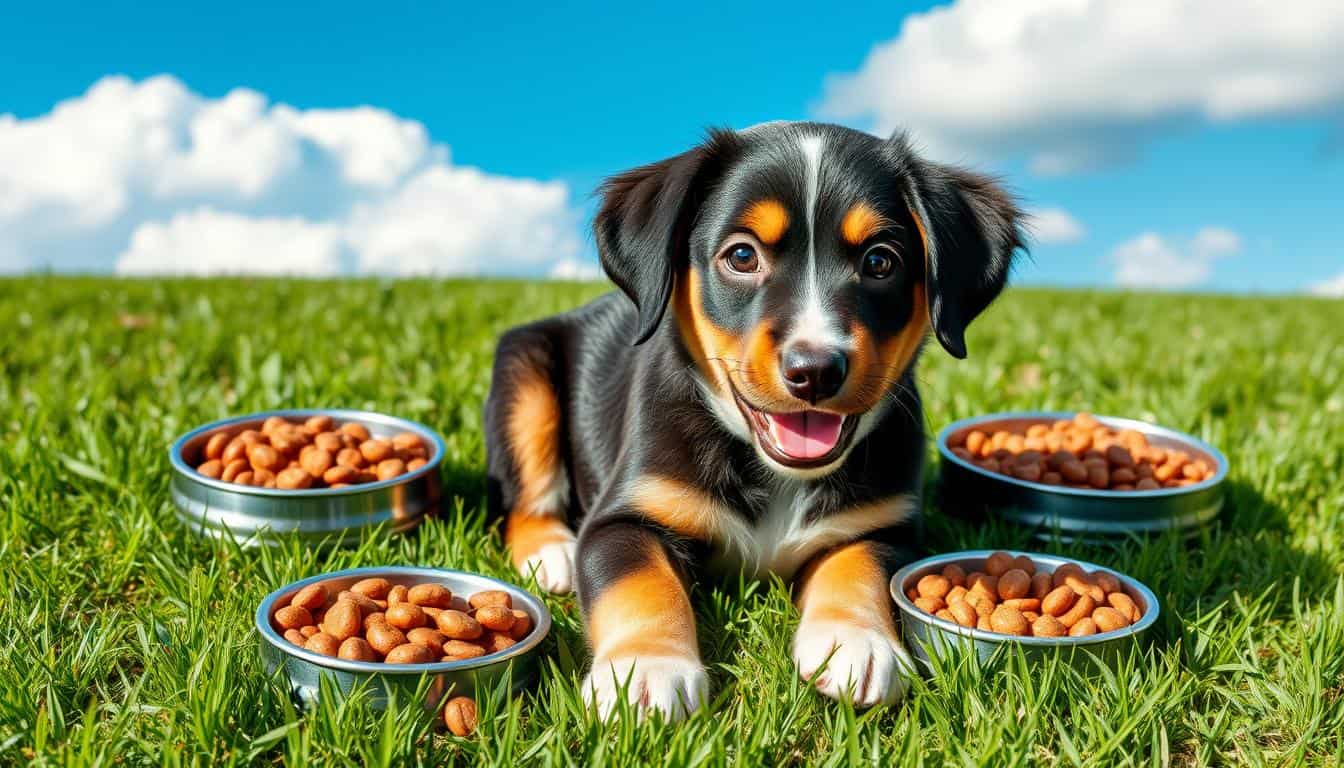Introduction
As a proud dog owner, I know finding the right puppy food can be tough. This is especially true for large breed pups. Their special nutritional needs can make choosing a food feel overwhelming. But don’t worry, with expert advice, you can find the perfect food for your pup’s growth and health.
In this guide, we’ll look at what large breed puppies need to eat. We’ll also talk about the important ingredients to look for. Plus, we’ll share the top food picks from industry experts. Whether your pup is a big Great Dane or a lively Labrador, this info will help you make the best choice for them.
- Understanding Large Breed Puppy Nutritional Needs
- What Makes Large Breed Puppy Food Different
- Key Ingredients to Look for in Large Breed Formulas
- Best Puppy Food for Large Breeds: Top Recommendations
- Common Feeding Mistakes to Avoid
- Managing Growth Rate Through Proper Nutrition
- Transitioning Between Puppy Food Brands
- When to Switch to Adult Dog Food
- Conclusion
- FAQ:
- What should you feed a large breed puppy?
- Is large breed puppy food worth it?
- What is the healthiest food to feed your puppy?
- What is the best large breed puppy food in the UK?
- Is there a difference between puppy food and large breed puppy food?
- Do large breed puppies need more protein?
- What are the key nutritional requirements for large breed puppies?
- What are the essential ingredients to look for in high-quality large breed puppy food?
- What common mistakes should I avoid when feeding my large breed puppy?
- When should I transition my large breed puppy to adult dog food?
Understanding Large Breed Puppy Nutritional Needs
Feeding a large breed puppy needs a careful mix of nutrients. This is to support their fast growth and development. It’s important to give them the right puppy nutrition large breeds to help them grow well and stay healthy.
Calcium and Phosphorus Balance
Getting the right balance of calcium and phosphorus is key for proper nutrition large breed puppies. Large breed puppies can be very sensitive to a bad situation. balance of these nutrients. It can lead to bone problems when not properly managed. So, it’s crucial to keep their diet balanced for healthy bones.
Protein Requirements for Growth
Protein is vital in the development of large breed puppies. They need more protein than smaller breeds because they grow faster. The high-quality protein they receive helps to grow and develop well.
Caloric Density Considerations
Large breed puppies have different calorie needs than smaller ones. Their food should have fewer calories to avoid too much weight. This is to prevent bone problems and keep them healthy.
“Ensuring a proper balance of key nutrients is essential for supporting the unique needs of large breed puppies during their critical growth phase.”
What Makes Large Breed Puppy Food Different
Feeding your giant breed puppy needs more than just regular puppy food. They have special nutritional needs for healthy growth. Giant breed puppy diet and nutritious large breed puppy food are made to meet these needs.
Large breed puppies need a special balance of calcium and phosphorus. This helps prevent bone problems from too fast growth. They also require protein in order to build stronger muscles.
The food’s calorie count is another key difference. Giant breed puppies grow slower and need less food to avoid obesity. This helps prevent health issues from too much weight gain.
| Characteristic | Regular Puppy Food | Large Breed Puppy Food |
|---|---|---|
| Calcium-Phosphorus Ratio | Higher Ratio | Carefully Controlled Ratio |
| Protein Levels | Higher Protein | Adjusted for Muscle Growth |
| Caloric Density | Higher Calories | Lower Calories |
Knowing these distinctions will help to select the appropriate food item for your giant breed puppy. This ensures they get the nutritious large breed puppy food needed for a healthy life.
Key Ingredients to Look for in Large Breed Formulas
Choosing the right healthy large breed puppy kibble is key. Look for ingredients that meet the special needs of large-breed puppies. They require the proper mix of fats, proteins, vitamins, and minerals for growth.
Essential Proteins and Sources
Large-breed puppies need high-quality proteins for muscle growth. Choose high-quality large breed puppy food with chicken, turkey, or lamb as main ingredients. These are easy to digest and support muscle development.
Beneficial Fats and Oils
Healthy fats and oils are crucial for large-breed puppies. Look for omega-3 and omega-6 fatty acids from fish oil or flaxseed. These fats are good for skin, coat, brain, and vision.
Crucial Vitamins and Minerals
- Calcium and phosphorus to build strong teeth and bones
- Glucosamine and chondroitin for joint health
- Antioxidants like vitamins C and E for a strong immune system
Focus on these ingredients to find the best high-quality large breed puppy food for your pup.
Best Puppy Food for Large Breeds: Top Recommendations
Choosing the right puppy food is key for large breed dogs’ health. Several premium options are the best for these dogs. They offer a mix of high-quality proteins, fats, and nutrients.
Here are some top puppy food picks for large breed dogs:
- Royal Canin Size Health Nutrition Large Puppy – This formula is made for large breed puppies. It has a special mix of nutrients for their growth.
- Hill’s Science Diet Large Breed Puppy – It’s made with top ingredients. It’s proven to help large breed puppies grow strong bones and joints.
- Purina Pro Plan Large Breed Puppy – It starts with real chicken. This food gives large breed puppies the energy and nutrients they need.
| Brand | Protein Content | Calorie Density | Key Nutrients |
|---|---|---|---|
| Royal Canin Size Health Nutrition Large Puppy | 28% | 376 kcal/cup | DHA, calcium, phosphorus |
| Hill’s Science Diet Large Breed Puppy | 27.5% | 367 kcal/cup | Glucosamine, chondroitin, omega-3s |
| Purina Pro Plan Large Breed Puppy | 30% | 389 kcal/cup | Antioxidants, probiotics, DHA |
When picking puppy food for your large breed dog, look at the nutrients, ingredients, and calories. These help meet their growth needs.
“Proper nutrition is essential for the healthy growth and development of large breed puppies. These top-rated formulas are designed to provide the perfect balance of nutrients to support their specific needs.”
Common Feeding Mistakes to Avoid
Feeding your large breed puppy right is key for their growth. Knowing common mistakes helps you give them the proper nutrition large breed puppies need.
Overfeeding Risks
One big mistake is overfeeding. Too many calories can make your puppy gain weight too fast. This can harm their bones and joints, leading to problems like hip and elbow dysplasia. Always follow the feeding guidelines for your puppy’s age, breed, and how active they are.
Inappropriate Food Choices
Choosing the wrong food is another big mistake. Puppies need special nutrients that adult dog food might not have. Make sure to pick a high-quality puppy food made for large breeds.
Feeding Schedule Errors
Having a regular feeding schedule is important. Irregular feeding can cause stomach problems and behavior issues. Keep a routine that fits your puppy’s natural eating times and check with your vet for the best feeding schedule.
Avoiding these mistakes helps your large breed puppy grow up healthy and happy. They’ll get the proper nutrition large breed puppies need.
Managing Growth Rate Through Proper Nutrition
As a pet parent of a large breed puppy, managing their growth rate is key. Giant breed puppy diet and puppy nutrition large breeds are vital. They help ensure your pup grows healthy and avoid skeletal and joint problems later.
Large breed puppies need a special diet. They should grow at a controlled pace, not too fast. Feeding them too much or the wrong food can cause hip and elbow dysplasia and other joint issues.
- Look for puppy nutrition large breeds that’s low in calories but rich in calcium and phosphorus.
- Stay away from diets with too much protein, as it can cause them to grow too quickly.
- Choose a formula made for large breed puppies. It will have the right nutrients for their growth.
“Proper nutrition is the key to managing the growth rate of large breed puppies. By providing a carefully balanced diet, you can help ensure your pup’s skeletal and joint health well into adulthood.”
| Nutrient | Recommended Range for Large Breed Puppies |
|---|---|
| Calcium | 1.0-1.5% of dry matter |
| Phosphorus | 0.8-1.2% of dry matter |
| Protein | 22-28% of dry matter |
| Fat | 12-18% of dry matter |
By managing your large breed puppy’s giant breed puppy diet and puppy nutrition large breeds carefully, you support their healthy growth. This sets them up for a lifetime of well-being.

Transitioning Between Puppy Food Brands
Switching your large breed puppy’s food needs care. But, with the right steps, it can be smooth. Start slow to avoid upset stomachs and help your puppy adjust.
Step-by-Step Food Changes
- Mix a little new food with their old food. Increase the new food bit by bit over 7-10 days.
- Watch how your puppy eats, their poop, and their energy. This helps you know if they’re adjusting okay.
- If your puppy gets sick or acts off, slow down the change or talk to your vet.
Signs of Successful Transition
- Your puppy eats well and seems excited for meals.
- Their poop is solid and they don’t show signs of stomach trouble.
- They stay active and full of energy, or even get more lively.
Common Adjustment Issues
Some puppies might feel off when they switch foods. They might have mild stomach problems or eat less. If these problems last more than a few days, see your vet.
Changing your large breed puppy’s food to a new nutritious large breed puppy food takes time and watching. A slow start and careful watching can make the change easy and good for your puppy.
When to Switch to Adult Dog Food
Deciding when to switch your large breed puppy to adult dog food is key for their health. This decision depends on your pup’s size, growth rate, and individual needs. It’s not just about the age.
Most large and giant breed puppies should switch to adult food between 12-18 months. But, it’s important to watch your pup’s growth closely. Talk to your vet to find the best time for your specific breed and pup.
When deciding on the switch, consider these factors:
- Breed size: Bigger breeds like Great Danes and Mastiffs might need more time, often 18-24 months. This ensures they get the right large breed puppy food recommendations and proper nutrition large breed puppies need.
- Growth rate: Some puppies grow faster than others. When they reach adult size, it’s time for adult food with fewer calories.
- Individual development: Watch your pup’s looks, energy, and health. This will help you know when it’s the right time for the switch.
Talking to your vet is crucial for knowing when to switch your puppy to adult food. Doing it right supports your pup’s growth and health. This way, they can live a happy and healthy life.
| Breed Size | Recommended Transition Age |
|---|---|
| Large Breeds | 12-18 months |
| Giant Breeds | 18-24 months |
“Proper nutrition is essential for the healthy growth and development of large breed puppies. Consulting with your veterinarian can help you determine the optimal time to transition to an adult dog food formula.”

Conclusion
Learning about the right food for your large breed puppy is key. It helps them grow strong and healthy. They need the right mix of proteins, fats, vitamins, and minerals for their fast growth.
The best puppy foods for big dogs are highlighted in this guide. Foods like Purina ONE SmartBlend Large Breed Puppy Formula and Hill’s Science Diet Puppy Large Breed dog food are top choices. They ensure your puppy gets the nutrients they need to thrive.
It’s important to manage your puppy’s food, growth, and transition to adult food well. Follow the tips here to aid you in raising a happy, healthy, and well-fed large breed dog.
FAQ:
What should you feed a large breed puppy?
Feeding large breed puppies requires a diet rich in balanced nutrients to support controlled growth and joint health. Opt for the best puppy food for large breeds, designed with precise calcium-to-phosphorus ratios and lower fat content to prevent rapid weight gain. These tailored formulas ensure proper development and reduce the risk of skeletal issues.
Is large breed puppy food worth it?
Investing in the best puppy food for large breeds is crucial for supporting proper bone development and joint health. These specialized diets provide tailored calcium and phosphorus levels, ensuring steady growth without overburdening their skeletal system. For large breed puppies prone to joint issues, such as hip dysplasia, this nutritional precision can prevent future health complications.
What is the healthiest food to feed your puppy?
The healthiest food for your puppy combines high-quality proteins, essential fats, and vital nutrients to promote robust growth and development. The best puppy food for large breeds often includes tailored formulas with controlled calcium levels, ensuring proper bone growth. Look for options rich in antioxidants and omega fatty acids to support overall health.
What is the best large breed puppy food in the UK?
In the UK, the best puppy food for large breeds often includes brands like Royal Canin Maxi Puppy and James Wellbeloved Large Breed Puppy. These formulas provide balanced nutrients, including joint-supporting glucosamine and controlled calcium levels, essential for healthy growth. Opt for options with high-quality protein and tailored calorie content for optimal development.
Is there a difference between puppy food and large breed puppy food?
Puppy food and large breed puppy food differ significantly in nutrient composition. Large breed formulas prioritize controlled calcium and phosphorus levels to support proper skeletal growth. The best puppy food for large breeds includes adjusted calories and protein to prevent rapid weight gain, reducing risks of joint and bone issues common in larger breeds.
Do large breed puppies need more protein?
Large breed puppies require a diet with controlled protein levels to support steady growth and prevent joint issues. While protein is essential, excess amounts can lead to imbalances in calcium and phosphorus. Choosing the best puppy food for large breeds ensures a balanced nutritional profile, promoting healthy development and reducing the risk of skeletal problems.
What are the key nutritional requirements for large breed puppies?
Large breed puppies need a balanced diet. This includes a good calcium to phosphorus ratio. They also need high-quality protein and the right amount of calories for growth.
What are the essential ingredients to look for in high-quality large breed puppy food?
Look for premium protein sources and healthy fats in good puppy food. It should also have important vitamins and minerals like calcium and phosphorus. Glucosamine is also key for bone health.
What common mistakes should I avoid when feeding my large breed puppy?
Avoid overfeeding and giving the wrong food. Also, don’t mess up the feeding schedule. These mistakes can harm your puppy’s health and growth.
When should I transition my large breed puppy to adult dog food?
The switch to adult food for large breeds usually happens between 12-18 months. Watch your puppy’s growth and talk to your vet to decide the best time.
Share your thoughts in the comments below! If you enjoyed this post, consider subscribing to our newsletter for more pet tips, stories and blogs!

